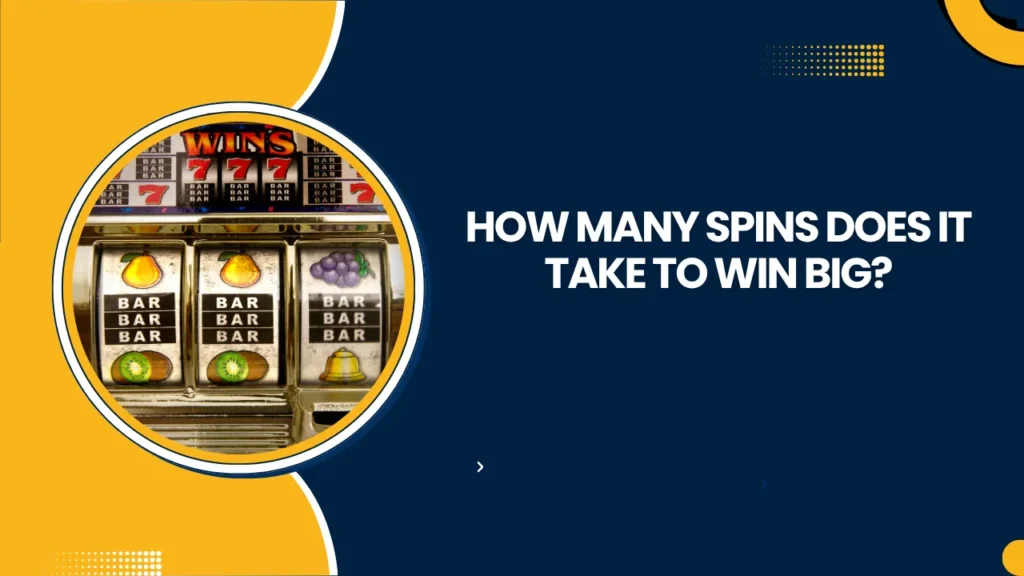If you’ve ever spent time at a slot machine, you’ve probably asked yourself this question: how many spins does it really take to hit a big win? Whether you play at a local casino or on your phone during a lunch break, the allure of that next spin is universal. Every press of the button brings new anticipation — maybe this time the reels will line up perfectly.
But the truth about slot spins and “big wins” isn’t as simple as luck striking at random. There’s a deeper mathematical structure behind every spin, controlled by algorithms, probabilities, and volatility. Understanding these mechanics won’t guarantee a jackpot, but it can help you play smarter, manage expectations, and appreciate how these games are designed to create both excitement and longevity.
Let’s dive into what really determines when — and if — a big win arrives.
The Random Reality of Spins
First, it’s important to clear up one of the biggest misconceptions about slot gaming: every spin is completely independent. Whether you’ve spun once or a thousand times, the machine doesn’t “owe” you a win. Modern slot games use Random Number Generators (RNGs), algorithms that produce thousands of numerical outcomes per second. When you hit the spin button, the RNG locks in a number that determines your result instantly.
That means even if a jackpot was triggered five seconds before you started playing, your spin outcome would be completely unrelated. There’s no such thing as a “due” win. Each spin has the same chance — whether it’s your first or your five hundredth.
However, the type of slot you’re playing does matter. Games with higher volatility tend to produce fewer but larger payouts, while low-volatility games deliver smaller, more frequent wins. If your goal is to win big, higher volatility slots are your best bet — but you’ll need patience (and a decent bankroll) to ride out the dry spells in between.
This is especially true for online players who explore platforms offering free spins no deposit uk. These promotions let players test their luck without risking real money, making them a great way to experience different volatility levels firsthand. You might not win massive jackpots using free spins, but they’re invaluable for understanding game rhythm and payout potential before committing your own funds.
Understanding Return to Player (RTP)
If RNGs make outcomes unpredictable, then RTP is the long-term counterbalance. RTP, or Return to Player percentage, indicates how much of the total wagered money a slot returns to players over millions of spins.
For example, a slot with a 96% RTP means that, on average, it pays out £96 for every £100 wagered — over a vast number of spins. It doesn’t mean you’ll get £96 back personally after spending £100, but rather that the game is statistically designed to return that amount over time.
When you think about “how many spins” it takes to win big, RTP helps set expectations. Even a high-RTP slot won’t guarantee short-term profit. In fact, you might experience long streaks of nothing before hitting a significant payout. The best players understand this isn’t a sign of “bad luck” — it’s just how variance works.
To visualize it, imagine tossing a coin 10 times and getting heads eight times. That doesn’t mean the coin is unfair — it’s just short-term randomness. Over thousands of tosses, it’ll likely average out closer to 50%. The same principle applies to slot spins.
Volatility: The Secret Ingredient of Big Wins
While RTP gives you a long-term statistical picture, volatility determines the emotional pace of the game. High-volatility slots are like roller coasters — long climbs of nothing punctuated by massive drops of excitement (and potential winnings). Low-volatility slots, on the other hand, are more like a gentle carousel — steady, smaller wins that keep your balance relatively stable.
Players chasing big wins often gravitate toward high-volatility games. These titles can go hundreds of spins without a major hit, then suddenly drop a 1000x payout that changes everything. The catch? It might take hundreds — even thousands — of spins to trigger that life-changing combination.
If you’ve ever wondered why some players seem to “get lucky” faster, remember that luck is just variance playing out in real time. One person might hit a jackpot in their first 20 spins, while another could play the same game for hours before seeing anything substantial. Over time, both players are still bound by the same odds.
The Psychology of Chasing Wins
Casinos and game developers understand that anticipation is just as powerful as the win itself. The sensory design of slots — flashing lights, rhythmic sounds, near-miss animations — all contribute to a cycle of engagement. Even when you don’t win, the game makes it feel like you almost did.
This psychological reinforcement encourages longer play sessions, which statistically increase the chance of hitting a big win — but also ensure the casino’s steady advantage. Responsible players recognize this balance and approach slots as entertainment, not income.
Many professionals adopt a “session-based mindset,” setting a spin or time limit before they start. For example, you might decide on 200 spins per game session. If you win, great; if not, it’s still a controlled experience. This discipline is what separates recreational players from those who risk chasing losses indefinitely.
How Bonuses and Free Spins Change the Math
Bonus rounds and free spins are where most big wins happen. That’s because these features often come with multipliers, stacked wilds, or jackpot triggers that dramatically increase payout potential.
For instance, you might spin hundreds of times in the base game with minimal results, only for the bonus round to deliver a 500x return in a single burst. That’s why experienced players focus less on individual spins and more on triggering those features.
Promotions like free spins offers — especially the kind where you don’t need to deposit money — are a valuable opportunity to explore these bonus structures. Not every bonus round leads to a jackpot, but understanding how they’re structured gives you an edge in choosing which games are worth your time.
Does Betting Size Matter?
Yes, but not in the way most players assume. Increasing your bet doesn’t change the odds of winning — the RNG works the same regardless of stake. However, larger bets can unlock higher-tier jackpots or bonus multipliers in some games.
That’s why you’ll sometimes see progressive jackpot slots requiring a minimum bet to qualify for the top prize. If your goal is truly to win big, understanding these thresholds is essential. Otherwise, you might hit the jackpot combination but only receive a fraction of the potential payout.
Still, smart bankroll management beats reckless betting every time. It’s better to spin more times at sustainable bet sizes than to burn through your budget chasing a big hit too quickly. Remember, variance is inevitable — but longevity improves your odds of catching a high-value spin.
Setting Realistic Expectations
So, how many spins does it take to win big? The honest answer: no one knows. Every spin is random, and while math can estimate long-term returns, there’s no formula for short-term luck. Some players win in a handful of spins; others might play thousands before striking gold.
Instead of asking “how many,” a better question might be “how long can I play enjoyably and responsibly?” The longer you can stay in the game without financial stress, the better your chances of experiencing one of those magical winning moments.
That’s also why patience is such a valuable trait in seasoned players. They understand that every spin contributes to the overall experience — not just the jackpot chase.
Conclusion
Winning big on slots isn’t about counting spins — it’s about understanding the blend of randomness, volatility, and timing that defines every game. The thrill lies in the unpredictability, and while no one can control when the next jackpot hits, you can control how you approach the journey.
By managing your bankroll wisely, choosing games that fit your style, and viewing each spin as part of the entertainment rather than a financial goal, you’ll enjoy a more rewarding experience overall. Big wins might be rare, but the satisfaction of playing smart, understanding the mechanics, and enjoying the ride is what truly defines a great player.











